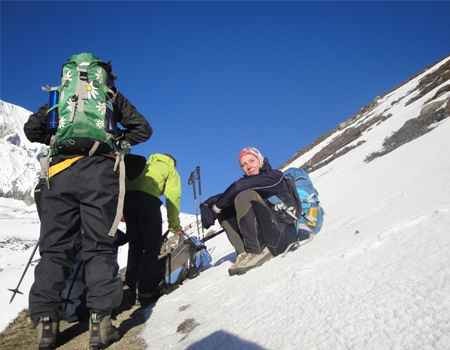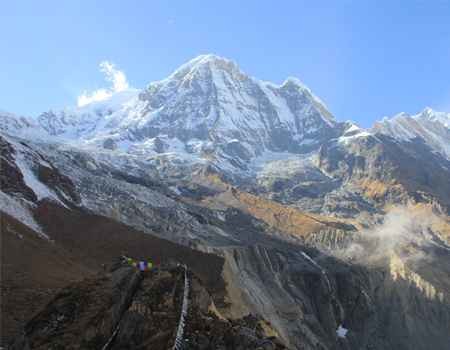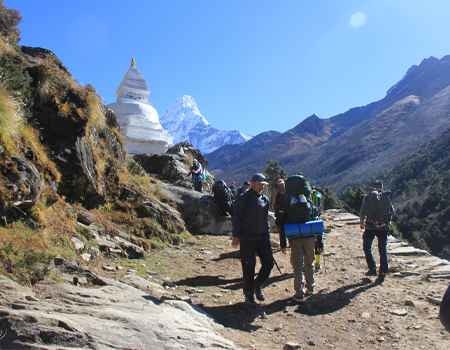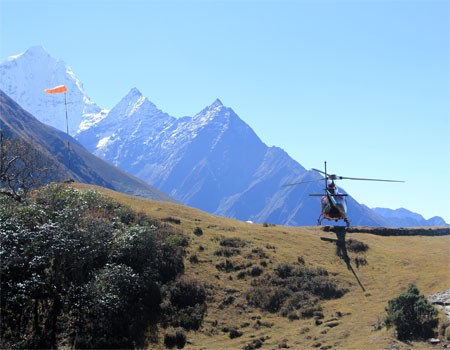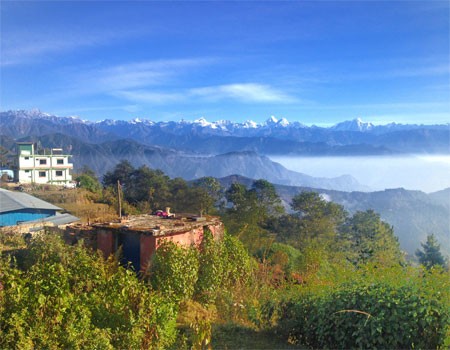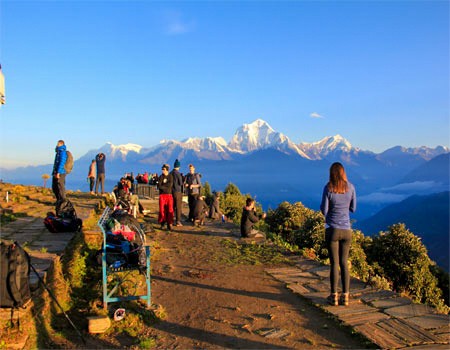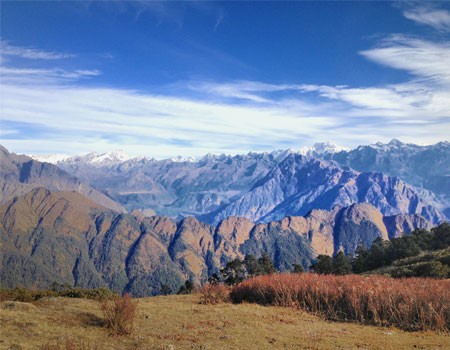First, you need to know that trekking in the Himalayas is complex and physical. Short Treks are easy hikes, so what makes them easy? The altitude and lack of oxygen make trekking challenging. Short Treks don't take trekkers to extremely high elevations, but I sometimes have to walk on steep paths.
Different regions have different short and easy trekking trails in Nepal. There are more Short Treks in the Annapurna than in Langtang and Everest.
Short Treks in the Annapurna Region
Ghorepani-Ghandruk Circuit Trek
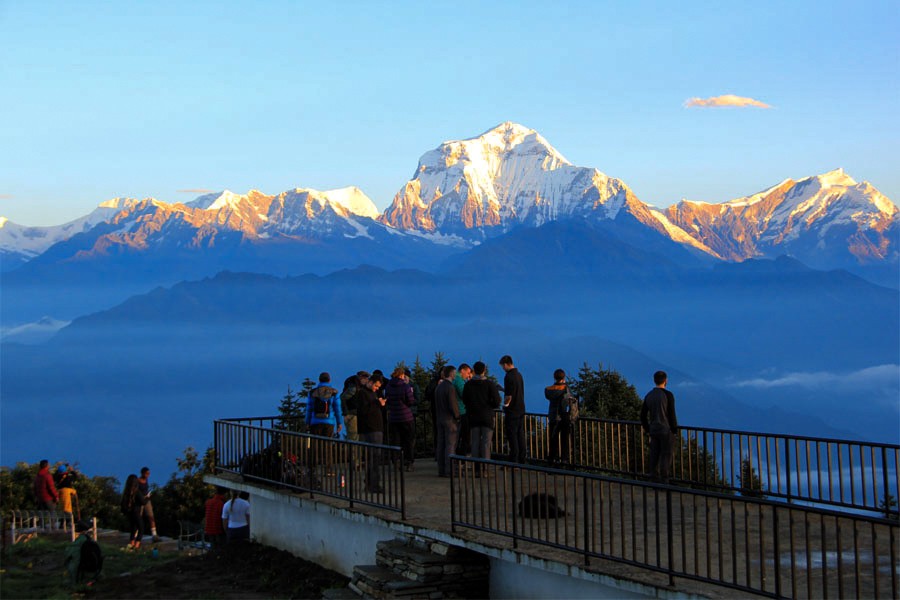
Dhaulagiri ranges from Poon hill
- Duration: 2–5 Days
- Highest Elevation: 3,210m
- Best Time to Visit: September to May
Trek Highlights
- Stunning mountain views of the Dhaulagiri and Annapurna massifs with an unblocking sunrise from Poon Hill
- Endearing landscapes and farming terraces
- Beautifully bloomed rhododendrons and cherry blossoms
- Waterfalls, rivers, and valleys
- Traditional settlements and culture
- Green hills, flora, and fauna
Ghandruk Circuit Trek Overview
Ghorepani Poon Hill is a Circuit Trek through Ghandruk Village. It is the busiest short Trek in the Annapurna region. The 5-day Ghandruk Circuit Trek begins in the beautiful lake city of Pokhara with a drive to Nayapul and walks to Tikhedhunga.
Right after crossing the Modi River, you will follow the Bhurungdi River Valley, where you can see beautiful waterfalls, rice fields, and more attractions throughout the day. You will walk mostly on the flat trail today.
The second-day walk is long and pretty steep at the beginning. After Banthanti, you enter the forest. The trail becomes prettier with the blooming cherry blossoms in November and December and rhododendrons in spring, and you reach Ghorepani. You feel like you are in a wonderland with colorful buildings and magnificent mountain views.
The main attraction of the Ghorepani Ghandruk Circuit Trek is Poon Hill. You will hike early in the morning with a flashlight from Ghorepani. After walking for around an hour, you reach the top of Poon Hill. You can see stunning views of Dhaulagiri, Tukuche, Nilgiri, Brahashikhar, Annapurna South, Fishtail (Machhapuchchhre), and more big mountains with an unblocking sunrise.
After a joyful Poon Hill Visit, the next destination is Tadapani, a hill station surrounded by a dense forest. You will have another pleasant day with outstanding views. Then, the trip will go to the most significant traditional Gurung village, Ghandruk. It is a Short Day, so you have plenty of time to explore this typical village and visit a cultural museum. The trip ends in Nayapul after about a 5-hour walk from Ghandruk and a drive back to Pokhara. This Trek can take 2–5 days, but it can extend up to one week longer via Landruk and Dhampus.
Ghorepani Ghandruk Circuit Trek Itinerary
Day 01: Drive to Nayapul and trek to Tikhedhyunga (1,540m). 4 hrs
Day 02: Trek from Tikhedhunga to Ghorepani (2,850m) 6-7 hrs
Day 03: Hike Poon Hill (3,210m) for 1 hour and Trek to Tadapani (2,630m). 5hrs
Day 4: Trek from Tadapani to Ghandruk (2,012m) 3 hrs
Day 05: Trek from Ghandruk to Nayapul (5 hours) and drive to Pokhara
The best time for the Ghorepani Ghandruk Trek is during the autumn and spring, but it is doable in the other seasons. Because it is not at a very high altitude, it will be an adorable temperature in winter and offer clear visibility. The summer monsoon season has a poor view, but you can still enjoy nature and culture on this Trekking Trail.
Mardi Himal Trekking
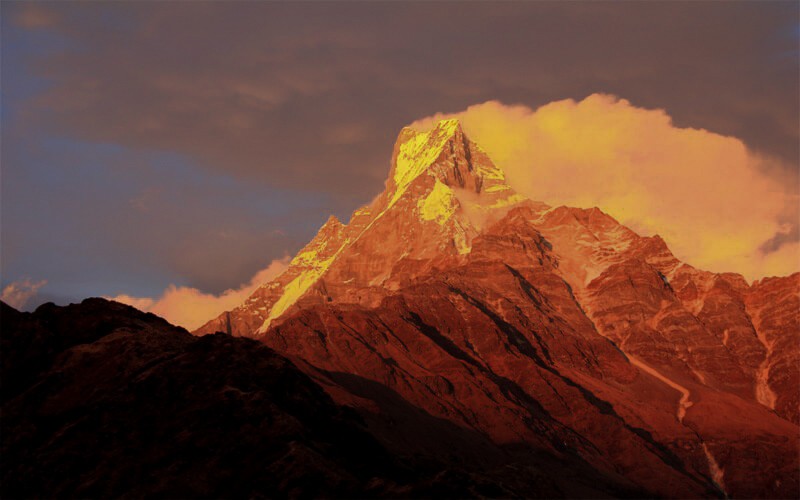
Fishtail from Mardi High Camp
- Duration: 5-7 Days
- Highest Elevation: 4,500m
- Best time to visit: September to November and March to May
Mardi Himal Highlights
- Reach the mountain within a few days from the city.
- An open view of the high, snow-capped mountains
- Artistic looks of the edges from a far distance
- Experiencing a rural lifestyle, tradition, and culture
- Blooming rhododendrons in spring
- Wildlife and vegetation
Mardi Himal Short Trek Overview
Mardi Himal Trekking is a new short trek in the Annapurna Region. It is becoming popular among both external and domestic trekkers. The Mardi Himal short Trek begins after a short drive from Pohara to Phedi, Kande, or Siding, then walks to the high camp and returns.
The most popular route to Mardi Base Camp is from Kande. After about half an hour's drive from Pokhara, you reach Kande, then start walking towards Deurali via Pothana and the Australian Camp. After Deurali Hill, the trail goes through a dense pine, oak, and rhododendron forest for about 4 hours to forest camp.
Forest Camp has numerous guest houses to stay in, but this place has no mountain views. Walking another half hour to the Rest Camp, you can see a stunning glimpse of the Annapurna and Manaslu massifs. It is the open area after Badal Danda, so the Modi Valley to the lower left and the view of the hills to the southern edge energize you to walk at a high altitude. Annapurna South, Hiuchuli, Annapurna I, II, III, IV, Fishtail, and many others follow the prettiness of the Mardi Himal Trekking Trail.
Mardi Himal Trekking Itinerary
Day 01: Drive from Pokhara to Kande and Trek to Deurali (2,100m). 4 hrs
Day 02: Trek from Deurali to Low Camp (2,970m) 6 hrs
Day 03: Trek from Low Camp to High Camp (3,540m) 5 hrs
Day 4: Hike to Mardi Base Camp (4,500m) for 3 hours and back to Badal Danda (3,210 m).
Day 05: Trek from Badal Danda to Siding (4 hrs) and Drive to Pokhara
The best time for the Mardi Himal Short Trek is from September to December and March to May. There is no snow on the trail in the autumn. The winter snow covers the hiking path and makes it slippery. The summer season brings lots of rain and poor visibility. So, you might not see mountains during this season.
Jomsom Muktinath Trekking
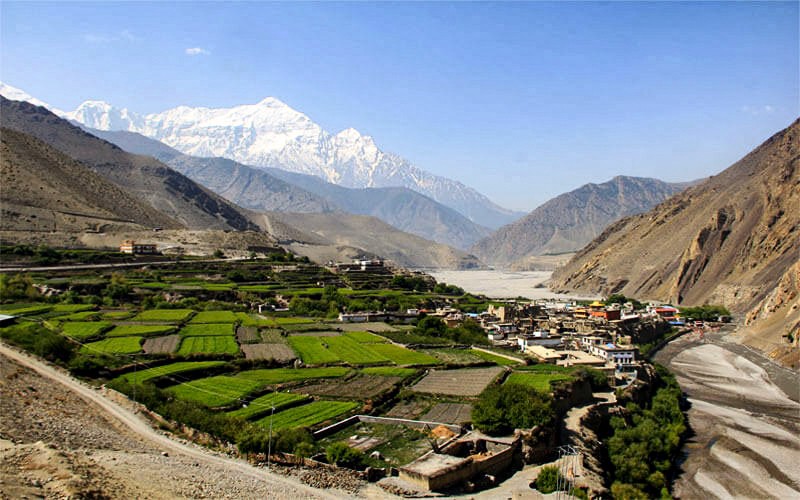
Kagbeni
- Duration: 7 days
- Highest Elevation: 3,760m
- Best time to visit: September to May
The Attraction of Jomsom Muktinath Trekking
- High Himalayan desert landscape
- Search for a fossil (Saligrama) on the Kaligandaki River bank.
- On the Grey Hills, there are numerous caves.
- Ancient and holy place Muktinath Temple
- Delightful Apple orchids, apple dishes, and drinks
- Traditional Thakali settlement, tradition, and lifestyle
- The world's deepest Kaligandaki River gorge
- The region's biggest waterfall (Rupse)
- Natural hot springs in Tatopani
- Magnificent mountain views from most places and Poon Hill
Trekking Introduction
Jomsom Muktinath is also renowned for Kali Gandaki Valley Trekking. It is in the lower Mustang, between Dhaulagiri and the Annapurna Himalayas. The territory of Kaligandaki Valley is pretty similar to Tibetan land. It is a deep valley between two massive Himalayas, so a big wind flows every afternoon. Kali Gandaki is a hidden, windy valley.
The locals from this region are called Thakali. The people staying in the Thak Khola area are called Thakali. These people are skilled in traditional Nepali food, Dal Bhat.
The Kali Gandaki Trek begins with a flight to Jomsom from Pokhara and treks to Kagbeni. On the second day, go to Muktinath. Walking through the Kaligandaki riverbank, you reach Marpha the next day. You can hang around Marpha by visiting the Buddhist monastery and experiencing the Thakali lifestyle and daily activities here. The next is Kalopani after Marpha, where you can see Annapurna I (8,091m). A natural hot spring in Tatopani relieves your tiredness from a long walk.
About a 7-hour walk from Tatopani brings you to Ghorepani. It is between two big hills, surrounded by a dense forest. You can see the panoramic view of Dhaulagiri and the Annapurna Massif from this place. The Trek ends at Nayapul after visiting Poon Hill early in the morning and then driving to Pohara.
If you have a shorter holiday for the Muktinath Jomsom Trek, you can drive directly to Pokhara through Ghorepani. Alternatively, you can fly from Nayapul to Muktinath and to Pokhara from Jomsom to make the Trek longer.
You can even do a Jeep Tour, which takes two days to Muktinath from Pokhara.
Muktinath Trek Itinerary
Day 01: Pokhara to Jomsom (2,720m): fight and trek to Kagbeni (2,800m) 2 hrs
Day 02: Trek from Kagbeni to Muktinath (3,760 m) in 4 hrs.
Day 03: Trek from Muktinath to Marpha (2,670m) 5-6 hrs
Day 4: Trek from Marpha to Kalopani (2,530m) 5-6 hrs
Day 05: Trek from Kalopani to Tatopani (1,190m) 6 hrs
Day 06: Trek from Tatopani to Ghorepani (2,850 m) in 7 hrs.
Day 07: Hike to Poon Hill (3,210m) and Trek to Nayapul (1,070m) for 7 hours, then drive to Pokhara.
The best time for Kaligandaki Muktinath Trekking is from September to December and March to May. The winter is also doable. You will have a nice view during the winter, but the temperature will be cold. Similarly, you can Trek to Muktinath in the summer.
Dhampus-Sarangkot Short Trek
- Duration: 3 days
- Highest Elevation: 1,650m
- Best Time to Visit: September to May
Dhampus Sarangkot Trip Highlights
- Unblocking sunrise from Sarangkot and Dhampus
- Traditional Gurung village, lifestyle, and daily activities
- Eye-captivating views of the Annapurna, Dhaulagiri, Manaslu, and Ganesh Himal ranges
- Beautiful view of Phewa Lake and Pokhara city
- Bonnie landscapes and farming terraces
Sarangkot Trekking Overview
Dhampus Sarangkot Short Trek is an easy hike near Pokhara in the Annapurna region. It is the perfect hike for beginners. Sarangkot Trekking begins with a drive to Phedi or Ghattekhola from Pohara and then to Dhampus. The hike is about three hours long, but the trail ascends. The village is open, so you see an unblocked sunrise with unreal views of the high, snow-capped mountains.
The second day is long, but the trail is not that difficult for Sarangkot. It is one of the best hill stations in Nepal for the sunrise. Graceful scenes of Annapurna I, II, III, and IV, Annapurna South, Machhapuchchhre (Fishtail), Lamjung Himal, and Manaslu are the main attractions of the Sarangkot. Fewa Lake and Pokhara City seem celestial from this hill.
The last day of the Dhampus Sarangkot Trek is easy descending. You will reach the side of Phewa Lake at the lakeside. Alternatively, you can take a paragliding flight from Sarangkot to Pokhara if you would like.
Dhampus Trek Itinerary
Day 01: Drive from Pokhara to Ghattekhola and Trek to Dhampus (1,650m). 3 hrs
Day 02: Trek from Dhapus to Sarangkot (1,592m) 6-7 hrs
Day 3: Trek from Sarangkot to Pokhara (820m) 3 hrs
The best time for the Dhampus Short Trek is from September to May, although you can also do it in the winter and summer. You do not have to go to a very high elevation, so winter might not be too cold. But the monsoons have poor visibility and mostly can't see mountains.
Short Treks in the Everest Region
Everest Panorama Trek
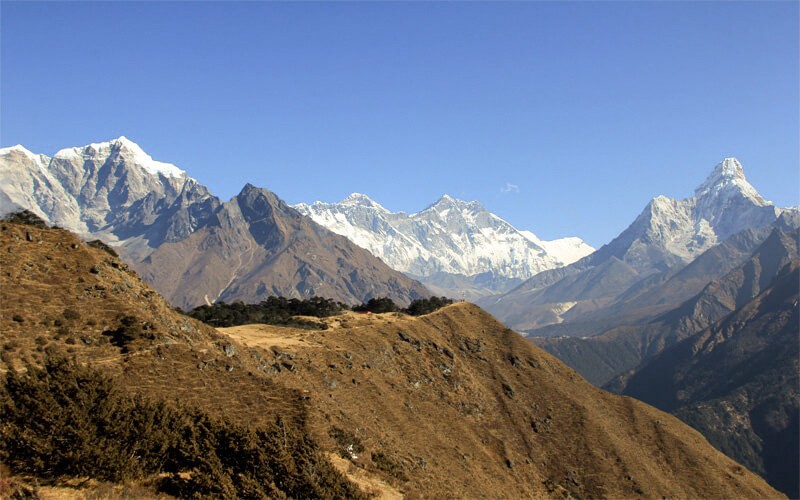
View from Everest view hotel
- Duration: 7 days
- Maximum Elevation: 3,860m
- Best Time to Visit: September to May
Everest Panorama Highlights
- An adventurous scenic flight to Lukla
- Traditional Sherpa villages with typically carved buildings
- Unreal views of Bonnie's snow-capped high mountains
- Ancient Buddhist monasteries, shrines, and other monuments
- Vantage viewpoints such as Everest View Hotel and Tengboche Hill
- Vegetation and wildlife
- Waterfalls, rivers, and streams
Everest Short Trek Overview
Everest Panorama is the Shortest Trek in the Everest Region and offers the gimps of the magnificent Himalayas, cultural feelings, natural beauties, and religious aspects in a short time. It starts with a scenic and adventurous trek to Lukla. Right after landing at Tenzing-Hilary airport, the Trek goes to Phakding through the beautiful Sherpa settlements of the Khumbu region.
The second day of the Everest Panorama Trek is pretty long, from Phakding to Namche Bazaar. You need to have a rest day for altitude practice on the third day and hike up to Syangboche Hill. Then, the Trek goes to Tengboche and turns back the same way to Monjo. On the sixth day, you walk back to Lukla and fly out the following morning to Kathmandu.
Compared to the other Short Treks in Nepal, the Everest Panorama is the primary cause of sickness. Although not all trekkers might have a problem with high altitudes, the different trekking routes start at a low elevation, but this one goes directly to 2,840m above sea level.
Everest Panorama Trek Itinerary
Day 01: Fly to Lukla (2,840m) for 30 minutes and Trek to Phakding (2,610 m).
Day 02: Trek from Phakding to Namche Bazaar (3,440m) 7 hrs
Day 03: Rest day at Namche and Hike to Everest View Hotel (3,880m) 4 hrs
Day 4: Trek from Namche Bazaar to Tengboche (3,860m) 5-6 hrs
Day 05: Trek back from Tengboche to Monjo (2,835m) 6 hrs
Day 6: Trek from Monjo to Lukla (2,840m) 4 hrs
Day 07: Fly out to Kathmandu
The best time for the Everest Panorama Trek is from September to May. Because it is not high enough, you can even do it in the winter. November and December offer the best visibility on this Trek. But summer is not a good season for the Everest Panorama. Usually, the Lukla flights can't operate in the monsoon with poor visibility.
Short Treks in the Langtang Region
Langtang Valley Trekking
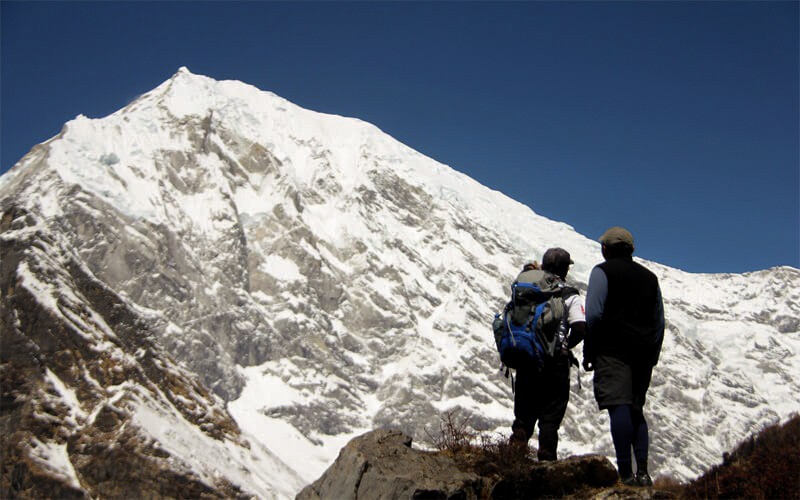
Langtang Lirung (7,225m)
- Duration: 7 days
- Highest Elevation: 3,870m
- Best time to visit: September to May
Langtang Valley Trekking Highlights
- Reach the high mountain within a few days of walking from Kathmandu.
- Tibetan Buddhist culture, religion, and local lifestyle
- Bird watching opportunity
- Visit the Yak cheese factory in Kyanjin Gompa.
- Waterfall, river, and beautiful valley
- Vegetation and wildlife
Langtang Valley Trekking Introduction
The Langtang Valley is a short cultural Trek in Nepal. It is the nearest mountain trail that brings you close to big mountains from Kathmandu in less than one week. This cultural trip is inside a national park. There are more than 300 spaces for colorful birds. So, it is not just a trekking trip but also a birdwatching tour. This region was hit terribly by the earthquake on April 25th, 2015.
This short Trek begins from Kathmandu and is followed by a long drive to Syabrubesi on a hillside road. Then, it goes to Lama Hotel, Langtang/Mundu, and Kyanjin Gompa. After exploring Kyanjin Ri, the cheese factory, and more, you start returning to the Lama Hotel and Syabrubesi. After spending the last night in Syafrubesi, you drive to Kathmandu.
Langtang Valley Trekking Itinerary
Day 01: Drive from Kathmandu to Syabrubesi (1,500m) 7 hrs
Day 02: Trek from Syabrubesi to Lama Hotel (2,410m) 6-7 hrs
Day 03: Trek from Lama Hotel to Mundu village (3,500m) 7 hrs
Day 4: Trek from Mundu to Kyanjin Gompa (3,870m) 3 hrs
Day 05: Trek from Kyanjin Gompa to Lama Hotel (2,410m) 7 hrs
Day 6: Trek from Lama Hotel to Syabrubesi (1,500m) 6 hrs
Day 07: Drive from Syabru to Kathmandu (1,350m) 7 hrs
The best time for Langtang Valley Trekking is September to May. You can also go to this region in the winter, but there might be heavy snowfall and trailblocks in the higher areas. But the monsoon is not the perfect season for Langtang Trekking.
Tamang Heritage Trail
- Duration: 6 days
- Highest Elevation: 3,165m
- Best Time to Visit: September to May
Tamang Heritage Trail Highlights
- Adventurous hillside road driving experience
- acknowledgment of Tamang culture, tradition, and activities
- The old traditional village of Gatlang, with wooden roofs and buildings
- Eye-captivating mountain views from Nagthali
- Trek in a peaceful environment.
- Waterfalls, rivers, valleys, and other natural beauties
- Vegetation and wildlife
About the Tamang Heritage Trail
The Tamang Heritage Trail is in the Langtang Region of Nepal. It is a short and easy cultural trek, so people who love experiencing nature and culture in Nepal can visit this trail. The same road drive to the Langtang Valley Trek leads to Tamang Heritage on the first day from Kathmandu. Then, it goes to the left from Syabrubesi, which has a long, ascending trail to Goljung Bhanjyang. After that, you have a flat part for the rest of your journey to Gatlang. It is a big Tamang Village. You'll see most buildings in this town that are roofed with planks.
After Gatlang, the trail descends towards the Chilime River Valley. Then it ascends for about three hours. This place used to have a natural hot spring before the 2015 earthquake, but there is none now.
Nagthali is the best hill station, from where you can see stunning mountain views. Long-range Langtang and Tibetan massifs offer fascinating glimpses, adding to the worth of this Trek from Nagthali Hill. The beautiful valley view to the lower right is also amusing. The last day to Syabrubesi is an easy descent and flat drive, followed by a drive back to Kathmandu.
Tamang Heritage Trail Itinerary
Day 01: Drive from Kathmandu to Syabrubesi (1,500m) 7 hrs
Day 02: Trek from Syabrubesi to Gatlang (2,238m) 5 hrs
Day 03: Trek from Gatlang to Tatopani (2,607m) 6 hrs
Day 4: Trek from Tatopani to Nagthali (3,165m) 4 hrs
Day 05: Trek from Nagthai to Syabrubesi (1,500m) 6 hrs
Day 6: Drive back to Kathmandu (1,350m). 7 hrs
Trekkers can visit the Tamang Heritage Trail from September to May, but sometimes it snows in the winter. Because of the not-very-high elevation, the snow melts within a few days on this Trekking Trail. Although! October to December and March to May offer the best views of the Tamang Heritage Route. The summer season is not perfect for the Tamang Heritage Trail. Lots of monsoon rainfall makes the walking path slimy in the summer. The driving road might also have problems with landslides during the monsoon.
Gosainkunda Trek
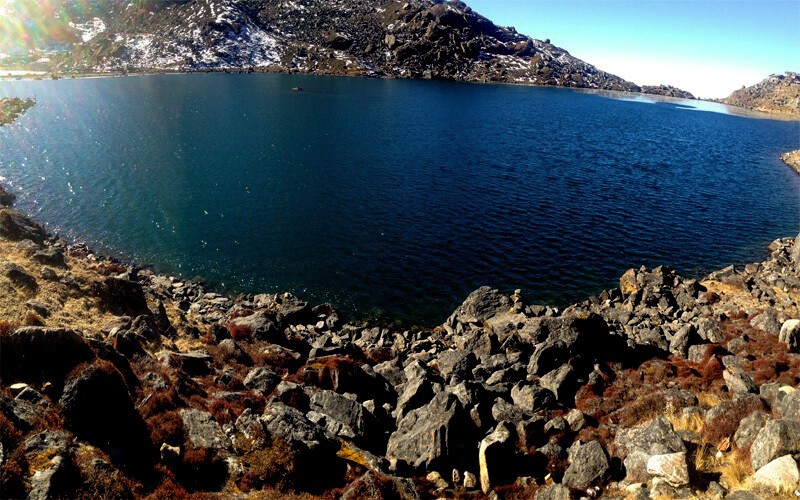
Gosaikunda lake
- Duration: 6 days
- Highest Elevation: 4,380m
- Best Time to Visit: Autumn and Spring
Gosainkunda Trek Highlights
- Experiencing nature, culture, and religion
- Tranquil, high Himalayan lakes
- Colorful blooming rhododendrons in spring
- Chances to see the Red Panda
- Hindu and Buddhist shrines, temples, monasteries, and other monuments
- Long-range, eye-captivating mountain views
Gosainkunda Trek Overview
Gosainkunda Lake is one of my favorite Treks in the Langtang Region. It combines walking through beautiful nature, culture, and religion. Tranquil holy lakes confer religious and natural beauties on the trekkers.
The Gosaikunda Trek begins with a long road trip to Dhunche. From Dhunche, you walk to Thulo Syabru, Lauribinayak, and Gosaikunda. After exploring the Gosainunda area, you trek back to Dhunche and drive to Kathmandu.
Gosaikunda is a holy place for both Hindus and Buddhists. There will be a big festival in August. The views from Thulo Syabru and Lauribinayak offer visitors the best Himalayan experience. You might have the opportunity to encounter a red panda on the way to Thulo Syabru in the rhododendron and pine forest.
Gosaikunda Trek Itinerary
Day 01: Drive from Kathmandu to Dhunche (1,960m) 6 hrs
Day 02: Trek from Dhunche to Thulo Syabru (2,250m) 6 hrs
Day 3: Trek from Thulo Syabru to Lauribinayak (3,910m) 6-7 hrs
Day 4: Trek from Lauribinayak to Gosaikunda (4,380m) 3 hrs
Day 05: Trek from Gosainkunda to Dhunche (1,960m) 6-7 hrs
Day 6: Drive back to Kathmandu (1,350m). 6 hrs
It snows heavily in the Gosaikunda territory during the winter. The winter season is not a good time to visit Gosaikunda, but you can see Lauribinayak. September to December and mid-March to early May are the best times for the Gosaikunda hike.
The nearest short Trek from Kathmandu
Chisapani Trek
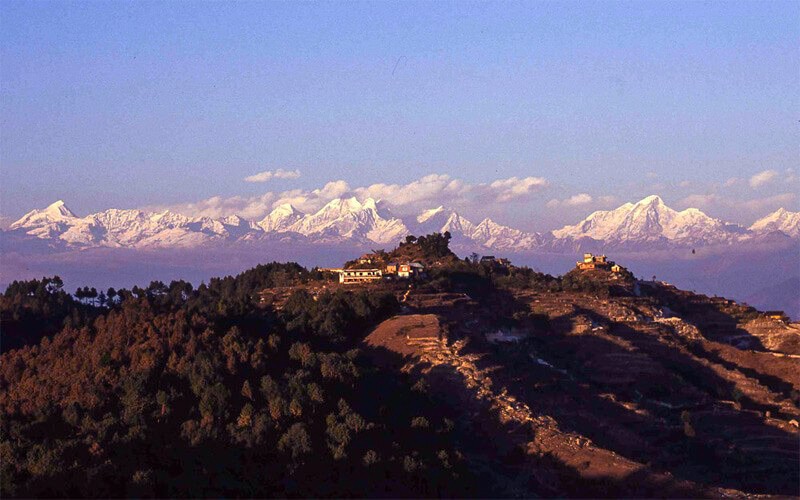
View from Nagarkot
- Duration: 3–4 days
- Highest Elevation: 2,375m
- Best Tie to Visit: September to May
Chisapani Trek Highlights
- See long-range, big, snow-capped mountains with a one-day walk from Kathmandu.
- Walk inside Shivapuri Nagarjuna National Park.
- Experience a village lifestyle just a few hours from the city.
- Valleys, green nature, landscapes, and more beauties
- Wildlife and vegetation
- Unblocking the sunrise from Chisapani and Nagarkot
Chisapani Trek Overview
The Chisapani Trail is the nearest Short Trek from Kathmandu. It is a three-day hike that can be extended to four days. Three-day plans end in Changunarayan, and a four-day trip goes to Dhulikhel from Nagarkot. Chisapani Trek is the best package for those who want to experience high mountains, typical village life, natural beauty, and more in a short period in Nepal.
The Chisapani Trek begins with a Short Drive to Sundarijal from the city center, then treks to Chisapani Hill through traditional villages and the national park. You can see beautiful valleys and farming terraces from the Chisapani hill station. The next destination is Nagarkot after Chisapani. You have stunning views of Ganesh Himal, Langtang, Gaurishankar, and the Tibetan massif along the way to Nagarkot. The unblocked sunrise from Nagarkot is another highlight of this Short Trek.
The Trek ends in Changunarayan after a 4-hour hike from Nagarkot and a drive to Kathmandu. If you have one or two more days, you can Trek further to Dhulikhel and Namobuddha.
Chisapani Trek Itinerary
Day 01: Drive from the city center to Sundarijal (1 hour) and Trek to Chisapani (2,375m). 5 hrs
Day 02: Trek from Chisapani to Nagarkot (2,175m) 6-7 hrs
Day 03: Trek to Changunarayan (1,350m) and drive to Kathmandu
You can trek the Chisapani Nagarkot Trail all year, but September to May is the best time. It is not a very elevated area, so you can even Trek during the winter. November and December are the best months for Chisapani Nagarkot. You will have clear visibility all day in these months.
Finally
There are many other trails, but the top-listed Short Treks in Nepal are the busiest Trekking Packages in the Nepalese Himalayas. These help acclimate for longer and more adventurous hikes elsewhere in the mountain region. If you like any of these trials and want more information, contact us.









